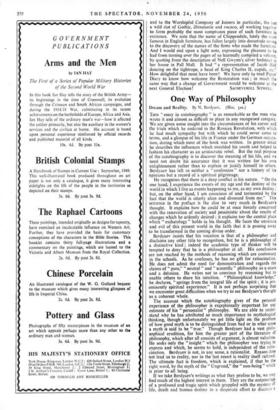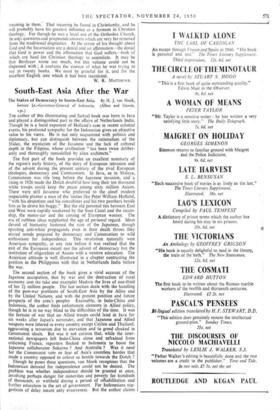One Way of Philosophy
Dream and Reality. By N. Berdyaev. (Bles. 303.) THIS "essay in autobiography" is as remarkable as the man who wrote it and almost as difficult to place in any recognised category. We are given some insight into the circumstances of his career and the trials which he endured in the Russian Revolution, with which he had much sympathy but with which he could never come to terms, and a glimpse of his life in France under the German occupa- tion, during which most of the book was written. In greater detail he describes the influences which moulded his youth and helped to fashion his character as an aristocratic rebel. But the real purpose of the autobiography is to discover the meaning of his life, and we need not doubt his assurance that it was written for his own enlightenment rather than to explain or justify himself to others. Berdyaev has left us neither a " confession " nor a history of his opinions but a record of a spiritual pilgrimage.
He recognises that there is a deep conflict in his nature. "On the one hand, I experience the events of my age and the destiny of the world in which I live as events happening to me, as my own destiny ; but, on the other hand, I am conscious of and tormented by the fact that the world is utterly alien and divorced from me." This sentence in the preface is the clue to very much in Berdyaev's thought. It explains how he could be at once fiercely concerned with the renovation of society and pessimistic about the results of changes which he ardently desired ; it explains too the central place which " eschatology " holds in his thought. He faces the unreason and evil of this present world in the faith that it is passing away to be transformed in the coming divine order.
Berdyaev insists that his vocation is that of a philosopher and disclaims any other title to recognition, but he is a philosopher of a distinctive kind ; indeed the academic type of thinker will be tempted to deny that he is a philosopher at all. His conclusions are not reached by the methods of reasoning which are customary in the schools. As he confesses, he has no gift for ratiocination. He does not admit the need for demonstration and regards the claims of " pure," " neutral " and " scientific " philosophy as a snare and a delusion. He writes not to convince by reasoning but to enable others to share his intuition. "Philosophical knowledge," he declares, "springs from the integral life of the spirit ; it is pre- eminently spiritual experience." It is not perhaps surprising that we encounter great difficulties when we try to see Berdyaev's thought as a coherent whole.
The account which the autobiography gives of the personal experience of the philosopher is exceptionally important for any estimate of his " personalist " philosophy. We are able to under- stand why he has attributed so much importance to mythological thinking, though unfortunately we get little light on the problem of how good myth is to be distinguished from bad or in what sense a myth is said to be "true." Though Berdyaev had a vast philo- sophical erudition, for him the greater part of the literature of philosophy, which after all consists of argument, is almost valueless. He seeks only the " insight " which the philosopher was trying to express and which, he seems to hold, is independent of the ratio- cination. Berdyaev is not, in any sense, a rationalist. Reason does not lead us to reality, nor in the last resort is reality itself ra.tionaL The ultimate fact is freedom, which is explained, if that be the right, word, by the myth of the " Ungrund," the "non-being" which is prior to all being.
If we take Berdyaev's writings as what they profess to be, we may find much of the highest interest in them. They are the outpourings of a profound and tragic spirit which grappled with the mystery of life, death and human destiny in a desperate effort to discover meaning in them." That meaning he found in Christianity, and he will probably have his greatest influence as a ferment in Christian theology. For though he was a loyal son of the Orthodox Church, he asks questions and propounds answers which are very far removed from the traditional dogmatics. At the centre of his thought about God and the Incarnation are a denial and an affirmation—the denial that God is power and the affirmation that God suffers—both of which are hard for Christian theology to assimilate. It may be that Berdyaev wrote too much, but this volume could not be dispensed with ; it contains the essence of what he was trying to say in twenty books. We must be grateful for it, and for the excellent English into which it ha's. been translated.
W. R. MATTHEWS.















































































 Previous page
Previous page